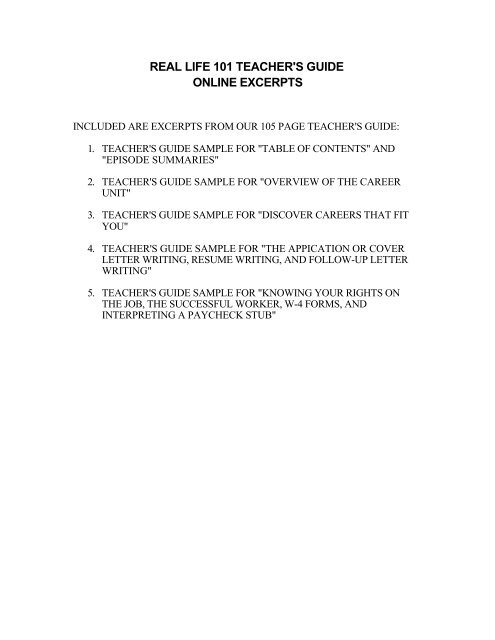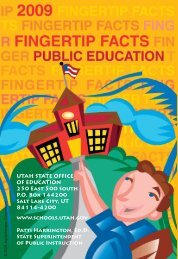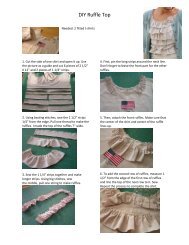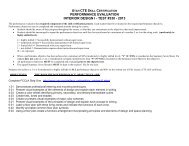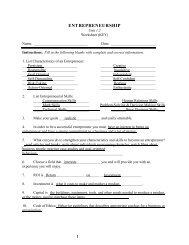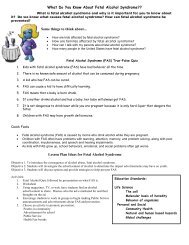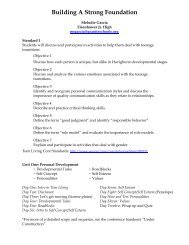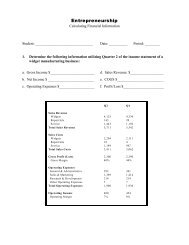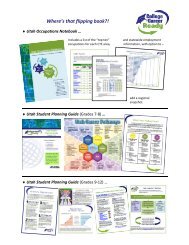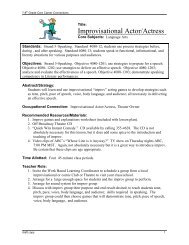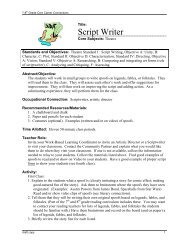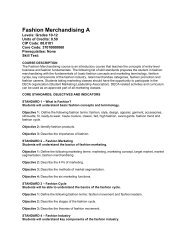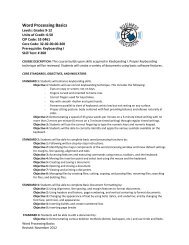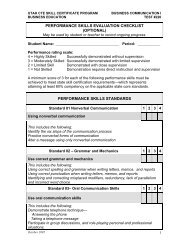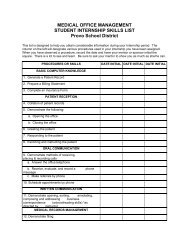REAL LIFE 101 TEACHER'S GUIDE ONLINE EXCERPTS
REAL LIFE 101 TEACHER'S GUIDE ONLINE EXCERPTS
REAL LIFE 101 TEACHER'S GUIDE ONLINE EXCERPTS
You also want an ePaper? Increase the reach of your titles
YUMPU automatically turns print PDFs into web optimized ePapers that Google loves.
<strong>REAL</strong> <strong>LIFE</strong> <strong>101</strong> <strong>TEACHER'S</strong> <strong>GUIDE</strong><br />
<strong>ONLINE</strong> <strong>EXCERPTS</strong><br />
INCLUDED ARE <strong>EXCERPTS</strong> FROM OUR 105 PAGE <strong>TEACHER'S</strong> <strong>GUIDE</strong>:<br />
1. <strong>TEACHER'S</strong> <strong>GUIDE</strong> SAMPLE FOR "TABLE OF CONTENTS" AND<br />
"EPISODE SUMMARIES"<br />
2. <strong>TEACHER'S</strong> <strong>GUIDE</strong> SAMPLE FOR "OVERVIEW OF THE CAREER<br />
UNIT"<br />
3. <strong>TEACHER'S</strong> <strong>GUIDE</strong> SAMPLE FOR "DISCOVER CAREERS THAT FIT<br />
YOU"<br />
4. <strong>TEACHER'S</strong> <strong>GUIDE</strong> SAMPLE FOR "THE APPICATION OR COVER<br />
LETTER WRITING, RESUME WRITING, AND FOLLOW-UP LETTER<br />
WRITING"<br />
5. <strong>TEACHER'S</strong> <strong>GUIDE</strong> SAMPLE FOR "KNOWING YOUR RIGHTS ON<br />
THE JOB, THE SUCCESSFUL WORKER, W-4 FORMS, AND<br />
INTERPRETING A PAYCHECK STUB"
<strong>REAL</strong> <strong>LIFE</strong> <strong>101</strong> <strong>GUIDE</strong> <br />
TABLE OF CONTENTS<br />
Introduction and Episode Summaries 3<br />
Career Unit Overview 17<br />
Career Unit 18<br />
Overview of Career Unit Internet Sites 20<br />
ICPAC: Discover Careers That Fit You Packet 21<br />
Explanation of Holland Code 27<br />
Career Internet Search Worksheet 30<br />
Newspaper Want Ads Activities 32<br />
Application for Employment 34<br />
The Letter of Application/Cover Letter, including sample 36-38<br />
The Resume, including sample 36-38<br />
The Follow-up Letter, including sample 39<br />
Interviewing Packet 41<br />
Job Shadow Student Question Sheet 48<br />
Job Shadow Student Reflection Sheet 50<br />
Vocational Interest Questionnaire 51<br />
Additional Internet Resource List 52<br />
Now that you have a job, what's next? 53<br />
Bibliography/Resource List 53<br />
Knowing Your Rights on the Job and The Successful Worker 54-56<br />
Filling out a W-4 Form with sample form 57-59<br />
Interpreting Paycheck Stubs 60-62<br />
Personal Finance 63<br />
Personal Finance: Banking Accounts 64-67<br />
How to Reconcile a Checkbook 68-69<br />
Establishing Credit 70-72<br />
Information on a W-2 Form 73<br />
Filling Out a Tax Return with sample forms 74-78<br />
Budgeting Your Income 79-82<br />
Appendix A: Career Areas to Explore and Jobs in Them 83<br />
Appendix B: Is the Military an Option for You? 84<br />
Appendix C: Working in High School 89<br />
Appendix D: Job Shadowing, Internships, etc... 92<br />
Appendix E: Parent Involvement = Student Success 94<br />
Appendix F: Skills You Will Need for the Workplace 99<br />
Excerpts of Advice Given by Guests Interviewed and Hosts 104
<strong>REAL</strong> <strong>LIFE</strong> <strong>101</strong> - CAREER EXPLORATION PROGRAM HOSTS:<br />
MAYA BAKKE, JOEY DUNCAN, JOY MALDONADO, ZUBI<br />
MOHAMMED, JEREMY SCOTT, CHRISTINA SILVA, AND MEAGHAN<br />
WESTERVELT.<br />
WELCOME TO <strong>REAL</strong> <strong>LIFE</strong> <strong>101</strong> - THE EXCITING AND<br />
INFORMATIVE PROGRAM THAT STEPS INTO THE LIVES OF<br />
FASCINATING PEOPLE TO SEE WHAT IT'S LIKE TO DO WHAT<br />
THEY DO FOR A LIVING!<br />
Episode summaries:<br />
Episode 1<br />
Sporting Events Coordinator<br />
FUBU Clothing Designers<br />
Public Information Scientist<br />
Sporting Events Coordinator<br />
Joey tries his hand at basketball when he visits with the coordinator of the<br />
Hoop-It-Up 3 on 3 Basketball Tournaments that are sponsored throughout<br />
the country. Nine hundred amateur teams participate in any given<br />
tournament in forty-four cities across the nation. Numerous tasks go into<br />
organizing these events including pulling together referees and volunteers<br />
that assist the coordinator, and contacting the local charities the<br />
tournaments benefit. Suggestions as to how to become involved in this<br />
type of work are given along with a list of other events to coordinate.<br />
Educational level: College Secondary level<br />
recommended classes: communications, physical<br />
fitness/sports, and business related courses.<br />
Related careers: Sports Management, Sports Sales and Promotion,<br />
Marketing, and Public Relations.<br />
MediaPro Expanded Career Clusters:<br />
06 Business, Management and Finance<br />
11 Legal, Social and Recreation Services<br />
13 Marketing, Sales and Promotion<br />
FUBU Clothing Designers<br />
Zubi hops a plane to New York City to catch up with the young<br />
entrepreneurs of FUBU Clothing. These five men started with a desire to<br />
have or create something of their own just for them. They all came from<br />
varied backgrounds and levels of education bringing different talents to the<br />
business. Their days are long and very busy, as they have had to learn the<br />
ins and outs of the clothing industry from the ground up. All agree<br />
education is the key to knowledge.<br />
Educational level: College is highly recommended.<br />
Secondary level recommended classes: art, drawing, math, design,<br />
communications and business related classes.
Related careers: Fashion Merchandising, Sales and Promotion,<br />
Journalism, Seamstress, Fashion Buyer, Fashion Distributor, Quality<br />
Controller, Clothing Inspectors, Public Relations.<br />
MediaPro Expanded Career Clusters:<br />
02 Art, Media and Communications<br />
04 Manufacturing and Processing<br />
06 Business, Management and Finance<br />
13 Marketing, Sales and Promotion<br />
Public Information Scientist Joey travels to Mt. St.<br />
Helens in Washington State to the U.S. Geological<br />
Survey of the Cascade Volcano Observatory to visit with a Public<br />
Information Scientist. His job is to relay information to the public on the<br />
activity surrounding volcanoes. He recaps the events that led up to the<br />
1980 eruption of Mt. St. Helen. He also relays information on earthquake<br />
activity and volcano facts. Joey goes into the lab to see what types of<br />
equipment and instruments are used to monitor and collect data on<br />
earthquakes in the lava dome. Job responsibilities, opportunities, travel<br />
requirements and necessary training and education are reviewed.<br />
Education level: College Secondary level<br />
recommended classes: math, science, geology, foreign<br />
language, communications, and public speaking.<br />
Related careers: Geologist, Engineering, Forest ranger, Guide,<br />
Firefighter, Photographer, Videographer, Seismologist, and<br />
Volcanologist.<br />
MedioPro Expanded Career Clusters:<br />
01 Agriculture and Natural Resources<br />
03 Engineering, Science and Technologies<br />
Episode 2<br />
NASA Launch Director<br />
Snake Venom Collector<br />
Firefighter Pilot NASA<br />
Launch Director<br />
Meaghan heads over to NASA at Cape Canaveral, Florida to meet up with<br />
the Launch Director for the Shuttle Program. He's the man who decides if<br />
ALL SYSTEMS ARE GO or not! She takes a tour of the facility including the<br />
control room area, the pulse of NASA. The director reveals what a typical<br />
launch day is like from gathering data, technical issues to the exciting<br />
count down and BLAST OFF! Educational requirements, employment<br />
opportunities, salary and job requirements are discussed as well as what it<br />
takes to be an astronaut.<br />
Educational level: College - Engineering fields recommended.<br />
Secondary school recommended classes: math, science, physics,<br />
chemistry, technical classes. Related careers:<br />
Aeronautics, Aerospace careers, Engineering,<br />
Scientists-all fields of study.<br />
MediaPro Expanded Career Clusters:
03 Engineering, Science and Technologies<br />
Snake Venom Collector<br />
Joey interviews a snake handler who has the dangerous job of collecting<br />
snake venom for scientific research. He discovers how rare this occupation<br />
is and the inherent risks associated with dealing with snakes both of the<br />
poisonous and non-poisonous varieties. Employment opportunities are few<br />
but available to those who are trained. Educational requirements and salary<br />
issues are covered.<br />
Educational level: College - Science and Medical fields recommended.<br />
Secondary school recommended classes: math, science and biology.<br />
Related careers: Medical fields including research, Animal Handler,<br />
Zoologist.<br />
MediaPro Expanded Career Clusters:<br />
03 Engineering, Science and Technologies<br />
09 Health Services<br />
Firefighter Pilot<br />
Joey caught up with a plane firefighter who flies WWII airplanes helping<br />
ground crew firefighters by dropping chemicals on forest fires out of<br />
control. He learns what the substance is made from and what actually<br />
happens when the chemicals hit the fire area. Team- work is the key to this<br />
job's success and he gets a chance to talk to some of the people who make<br />
it all work. Job requirements, training, employment opportunities and<br />
salary are discussed. Educational level: College<br />
recommended, Fire Tech training, Pilot's license<br />
required.<br />
Secondary school recommended classes: math, science, fitness<br />
Related careers: Firefighter, Airline Pilot, Helicopter Pilot,<br />
Government related occupations with the Dept. of Forestry, and<br />
Dept. of Defense, Pyro Technician.<br />
MediaPro Expanded Career Clusters:<br />
12 Protective Services<br />
14 Transportation<br />
**Additional special segment is featured in this episode on Networking.<br />
Joey offers some real life tips and statistics on how jobs are acquired and<br />
the importance of Networking in job hunting.<br />
Episode 3 Nike<br />
Shoe Designer<br />
Paramedic<br />
Marine Scientist<br />
Nike Shoe Designer<br />
Joey flew out to Beaverton, Oregon to Nike Headquarters to see what it's<br />
like to design tennis shoes for professional athletes. He discovers that<br />
designers actually work firsthand with some of the sports industries most<br />
famous players. The designer interviewed discusses his personal<br />
background that lead to this fantastic career and what it takes to be a
successful designer. Education and experience required along with salary<br />
and job potential are reviewed.<br />
Educational level: College Secondary level<br />
recommended classes: art, graphics, drafting, math,<br />
computer science. Related careers:<br />
Fashion Designer, Fashion Merchandising,<br />
Architect, Engineer.<br />
MediaPro Expanded Career Clusters:<br />
02 Art, Media and Communications<br />
03 Engineering, Science and Technologies<br />
04 Manufacturing and Processing<br />
13 Marketing, Sales and Promotion<br />
Paramedic<br />
Meaghan travels to Boston to ride along with two Paramedics on their shift.<br />
She learns firsthand why many hours worth of training goes into being a<br />
successful Paramedic. The typical day of an 8- hour shift is discussed<br />
along with the difference between working for a private service, verses a<br />
hospital is covered. Required training, employment opportunities and<br />
average salary are described. Educational level:<br />
College recommended, Vocational/Technical Training,<br />
Paramedic/EMT certification Secondary level<br />
recommended classes: math, science, health, first aid, and<br />
communications.<br />
Related careers: Emergency Medical Technician, Policemen,<br />
Firefighter, and Medical related careers.<br />
MediaPro Expanded Career Clusters:<br />
09 Health Services<br />
Marine Scientist<br />
Zubi and guest host, Ally drops in on the Aquarium of the Americas located<br />
in New Orleans, Louisiana. They meet up with a Marine Scientist<br />
responsible for taking care of the Shark Aquarium exhibit and get<br />
experience themselves preparing the daily meal for the animals. Research<br />
and data collecting as well as other aspects of aquatic care are cited. How<br />
to get into the field of marine science, job training requirements and<br />
opportunities and salary are explained.<br />
Educational level: College, ALTAC Sea courses recommended.<br />
Secondary level recommended classes: math, biology, and chemistry<br />
Related careers: Biologist, Zoologist, Veterinarian, and Professional<br />
Diver<br />
MediaPro Expanded Career Clusters:<br />
01 Agriculture and Natural Resources<br />
03 Engineering, Science and Technologies<br />
Episode 4<br />
Naval Explosives Expert<br />
Ride Safety Engineer<br />
Dentist
Naval Explosives Expert<br />
Jeremy hopped on a plane to San Diego where he met up with a group of<br />
naval recruits who work with bombs for a living. These men are trained to<br />
clear out any explosive matter on land or water, and are often required to<br />
dive or parachute into dangerous areas to complete the job. Jeremy has a<br />
chance to try on the protective armor and operate a robot helper in a<br />
simulated recovery of an explosive device. The US Navy Commander in<br />
charge outlines the necessary training requirements as well as salary and<br />
job opportunities.<br />
Educational level: College recommended, Naval Military training<br />
Secondary level recommended classes: math, science, physics, scuba<br />
diving, ROTC training.<br />
Related careers: Policeman-Explosives Expert, Government related<br />
careers i.e. Dept. of Defense Bomb Squad, Professional Diver.<br />
MediaPro Expanded Career Clusters:<br />
03 Engineering, Science and Technologies<br />
12 Protective Services<br />
Ride Safety Engineer<br />
Maya visited with a Ride Safety Engineer Manager atop the Stratosphere<br />
Hotel in Las Vegas, Nevada at the height of 1000 feet above the ground! He<br />
and his crew are responsible for inspecting all the parts, tracks, and<br />
motors of the rides for correct function and safety. Maya follows his typical<br />
day and the pros and cons of his job. Background training, job<br />
requirements and salary are reviewed.<br />
Educational level: College Secondary level<br />
recommended classes: math, science, physics,<br />
mechanical and technical training.<br />
Related careers: Aircraft Mechanics, Machinist, Mechanical<br />
Engineering, and Aircraft Inspector.<br />
MediaPro Expanded Career Clusters:<br />
03 Engineering, Science and Technologies<br />
05 Mechanical Repair and Precision Crafts<br />
07 Building Construction<br />
Dentist<br />
Meaghan takes a trip to the Dentist's office to see what it's like to be on the<br />
other side of the drill. She interviews a dentist specializing in General<br />
Dentistry covering his typical day of a range of cases, running his own<br />
business and looks in on a patient exam. She gets a check-up as well. Over<br />
coming the phobia of visiting the dentist is discussed along with the<br />
necessary educational requirements, on going training in the field and<br />
salary.<br />
Educational level: College Secondary level<br />
recommended classes: math, science, biology, physics,<br />
chemistry, business.<br />
Related careers: Orthodontist, Dental Hygienists, X-Ray<br />
Technicians, Medical Doctor, and Medical field related careers.
MediaPro Expanded Career Clusters:<br />
06 Business, Management and Finance<br />
09 Health Services<br />
** Additional special segment is featured in this episode on the American<br />
Vocational Association convention. Highlighted are interviews with<br />
conference vendors including, Young Entrepreneur Magazine. More<br />
information on this publication can be found on our web-site at<br />
www.mediakids.com<br />
Episode 5<br />
Helicopter Pilot<br />
NBA Color Analyst/Sports Announcer<br />
Professional Baseball Manager<br />
Helicopter Pilot<br />
Zubi goes up in a helicopter with a TV News Helicopter Pilot on assignment<br />
for a station in Orlando, Florida. He gets a bird's eye view of news in the<br />
making from high above the city. Suggestions on how to enter the field of<br />
piloting is discussed along with the necessary training and certification<br />
required. Issues concerning employment opportunities, salary and job<br />
qualifications are mentioned as well. Educational level:<br />
College recommended, Vocational/Technical training,<br />
Pilot's license, Field Certification. Secondary level<br />
recommended classes: science, math, journalism,<br />
mechanical training.<br />
Related careers: Aviation Mechanic, Airplane Pilot, Military Pilot,<br />
Aeronautics, Journalism, Helicopter Paramedic Rescue.<br />
MediaPro Expanded Career Clusters:<br />
02 Art, Media and Communications<br />
05 Mechanical Repair and Precision Crafts<br />
12 Protective Services<br />
14 Transportation<br />
NBA Color Analyst/Sports Announcer<br />
Jack Givins, former NBA player with the Atlanta Hawks offers great advice<br />
to all aspiring young athletes. He continued his love of sports after retiring<br />
from the game by becoming a Sports Color Analyst with the Orlando Magic.<br />
He reports on what's happening in the game and why from the technical<br />
point of view. In this segment, information is given on other sports related<br />
careers, job opportunities, and the need for education.<br />
Educational level: College Secondary level<br />
recommended classes: journalism, TV/Radio production,<br />
sports/physical education, and communications/speech.<br />
Related careers: Sports Administration, Sports Medicine, Public<br />
Speaking, TV/Radio Production, Journalism, Reporter, and<br />
Production Assistant.<br />
MediaPro Expanded Career Clusters:<br />
02 Art, Media and Communications<br />
11 Legal, Social and Recreation Services
Professional Baseball Manager<br />
Joey dropped in to see the Manager for the Norwich Navigators, an AA<br />
Baseball team in Norwich, Connecticut. Here he trains young ball players<br />
for the move up to the major leagues with the New York Yankees. His<br />
typical day as well as the pros and cons of the job are discussed along with<br />
how one gets into the business of professional baseball and salary ranges.<br />
Educational level: College Secondary level<br />
recommended classes: general college preparation, sports<br />
and physical fitness, health, business classes.<br />
Related careers: Sports related careers; cameraman, vendor,<br />
promotions, announcer, merchandise manager, equipment manager,<br />
trainer, and team mascot.<br />
MediaPro Expanded Career Clusters:<br />
08 Educational Services 11 Legal, Social<br />
and Recreation Services<br />
**Additional Special Segment is featured on this episode on Money<br />
Management. Highlighted are banking skills, checkbook use and<br />
management, and using an ATM.<br />
Episode 6 National<br />
Parks Guide<br />
Hair Stylist<br />
Animal Trainer<br />
National Parks Guide<br />
Joey travels out to the border of Nevada and Arizona to take a tour of the<br />
Hoover Dam and visit with a Dam Guide. He discovers what personal skills<br />
and training go into being a successful guide. Good memorization skills<br />
and being able to speak in front of large groups of people are keys to<br />
success in this interesting job.<br />
Educational level: Field training<br />
Secondary level recommended classes: Public speaking, communications,<br />
and foreign languages. Related careers:<br />
Motivational Speaker, Politician, Teacher, and<br />
Public Speaker. MediaPro<br />
Expanded Career Clusters;<br />
08 Educational Services 11 Legal, Social<br />
and Recreational Services<br />
Hair Stylist<br />
Joey drops in on Serenity Salon and Day Spa to see what it's like to cut and<br />
style hair for a living. Being creative and helping people feel better about<br />
themselves make this job a real plus. Joey, himself gets a make over in the<br />
process. New trends in the industry towards day spas and wellness centers<br />
are discussed as well as salary expectations and what a typical day might<br />
entail.<br />
Educational level: Vocational/Technical training in Cosmetology areas,<br />
State licensing required.
Secondary level recommended classes: general secondary course<br />
requirements, business classes.<br />
Related careers: Cosmetologist, Nail Tech, Message Therapist,<br />
Aestheticians, Spa Owner/Manager.<br />
MediaPro Expanded Career Clusters:<br />
06 Business, Management and Finance<br />
10 Personal and Commercial Services<br />
Animal Trainer<br />
Maya and Jeremy went by to see the Head Trainer at Amazing Animals<br />
Teaching Zoo, a training zoo for animals hired for TV and the movies. They<br />
watched exotic animals perform tasks and tricks using props. Some of the<br />
animals observed are African lion, North American black bear, Bengal tiger,<br />
hawk, chimpanzee, and mountain lion or cougar. They learn that the animal<br />
training industry is one that is growing due to the appeal of animals and<br />
the fact that in every 3 to 4 commercials on TV today feature an animal of<br />
some sort. Many trainers at the Teaching Zoo are there to learn and move<br />
on to other careers working with animals, such as zoological and animals<br />
of hire jobs. Educational level: College,<br />
Specialized training at the Amazing Animals<br />
Teaching Zoo. Secondary level<br />
recommended classes: biology, psychology, and<br />
communications.<br />
Related careers: Zoologist, Psychologist, Animal Behaviorist, Zoo<br />
Handler, Veterinarian, Vet Tech, Teacher, Park Ranger, Circus<br />
Animal Trainer, and TV/Movie Industry related careers.<br />
MediaPro Expanded Career Clusters:<br />
01 Agriculture and Natural Resources<br />
08 Educational Services<br />
09 Health Services<br />
Episode 7<br />
Fashion Designer<br />
Special Effects Artist<br />
Interior Designer<br />
Fashion Designer<br />
Maya and Meaghan hung out with three self-made designers of EDMC<br />
Clothing. These young entrepreneurs started their business from scratch<br />
with only some college background. They have learned the business from<br />
the ground up, from making a garment to marketing, retail sales and the<br />
nature of the competition in the trade. Their advice is invaluable to any<br />
young person beginning to discover their own career interests.<br />
Educational level: College recommended.<br />
Secondary level recommended classes: art, design, and business.<br />
Related careers: Fashion merchandising, Modeling, Magazine and<br />
Catalog Publications, Professional Artist.<br />
MediaPro Expanded Career Clusters:<br />
02 Art, Media and Communications
04 Manufacturing and Processing<br />
06 Business, Management and Finance<br />
13 Marketing, Sales and Promotion<br />
Special Effects Artist<br />
Maya and Meaghan stop by to see a professional make-up artist at the Joe<br />
Blasso Make-up Artist Training School in Orlando, Florida. Here artists are<br />
being trained in the unique technical craft of TV and movie make-up, from<br />
stage make-up to full-blown body suits and make-up worn by creature and<br />
monsters. This demanding job requires the artist to not only be talented at<br />
applying make-up but also work through a process of making body casts,<br />
clay molds, and molded foam to create the necessary parts of an individual<br />
to build the look of the character. Information is shared about how to get<br />
involved in this exciting career, as well as necessary training, and expected<br />
income.<br />
Educational level: Specialized training program at the featured training<br />
center, College recommended, and experience at college film departments<br />
is a plus. Secondary level recommended<br />
classes: art, sculpture, painting, theater<br />
arts, and TV/film production.<br />
Related careers: Costume Designer, Professional Artist,<br />
Cosmetologist, Television and Movie Industry related careers.<br />
MediaPro Expanded Career Clusters:<br />
02 Art, Media and Communications<br />
10 Personal and Communications<br />
Interior Designer Meaghan interviews an<br />
interior designer who owns her own business and<br />
specializes in decorating model homes for contract builders. She has<br />
control of all aspects of the physical setting of the home from tile, fixtures,<br />
paint, and carpet to the furniture and accessories needed to complete the<br />
style desired. Elements of design are discussed as well as job<br />
qualifications, income potential and educational requirements.<br />
Recommendations are made as to how to get involved in the business at<br />
an entry level.<br />
Educational level: College<br />
Secondary level recommended classes: art, design, drawing,<br />
communications, math and business. Related careers:<br />
Realtor, Building Contractor, Architect, Fashion<br />
Designer, and Painter.<br />
MediaPro Expanded Career Clusters:<br />
02 Art, Media and Communications<br />
06 Business, Management and Finance<br />
07 Building and Construction 13<br />
Marketing, Sales and Promotion<br />
Episode 8<br />
Whitewater Rafting Instructor/Guide<br />
Motorcycle Mechanic
Firefighter<br />
Whitewater Rafting Instructor/Guide<br />
Jeremy and Joey travel to the mountains of No. Carolina to catch up with a<br />
river raft guide on the Nantahala River, a class 2-3 river. There they learn<br />
what it takes to get into the career of being a river guide. Personal<br />
experiences of the guide interviewed are featured. The requirements of the<br />
job as well as the education and training needed, employment<br />
opportunities and salary information are highlighted.<br />
Educational level: field certified instructor/guide Secondary<br />
school recommended classes: history, geology, foreign<br />
language, first aid, and business related classes. Related<br />
careers: Parks and Recreation services, Forestry Dept.<br />
services.<br />
MediaPro Expanded Career Clusters:<br />
01 Agriculture and Natural Resources<br />
10 Personal and Commercial Services<br />
11 Legal, Social and Recreational Services<br />
Motorcycle Mechanic Meaghan visits with a<br />
Harley Davidson motorcycle mechanic. She learns<br />
what it takes to be a trained mechanic including a year-long program<br />
offered by Harley Davidson at the Motorcycle Mechanics Institute. Pros and<br />
cons of the job are discussed including one of the biggest plusses being<br />
test-driving some really awesome bikes. Employment opportunities,<br />
educational training, job requirements and salary is reviewed.<br />
Educational level: vocational technical school-mechanics, field certified<br />
Secondary school recommended classes: math, science, auto mechanics<br />
Related careers: Auto Mechanic, Airplane Mechanic, Electrician,<br />
Plumber, Carpenter, Helicopter Mechanic, and Computer Repair,<br />
Building Contractor. MediaPro<br />
Expanded Career Clusters: 05 Mechanical<br />
Repair and Precision Crafts<br />
Firefighter<br />
Guest host, Jewel, takes a tour of the firehouse with the Fire Captain who<br />
shares his own personal experiences on becoming a fireman. The type of<br />
personality needed for this demanding job both physically and mentally is<br />
discussed. The typical day in the firehouse on a routine shift including the<br />
duties of team members is highlighted. Employment opportunities, salary,<br />
educational and job requirements are featured.<br />
Educational level: College recommended, Fire Tech Training Program<br />
Secondary school recommended classes: math, science, health, and<br />
fitness. Related careers: Paramedic,<br />
EMT, Plane Firefighter, and Arson<br />
Detective.<br />
MediaPro Expanded Career Clusters:<br />
12 Protective Services Episode 9
Photo Journalist<br />
Stereo Technician<br />
Police Officer<br />
Photo Journalist<br />
Zubi heads out to San Diego to interview a news-photo journalist with the<br />
San Diego Union Tribune newspaper. The characteristics of the job,<br />
training required and average earnings are discussed. Zubi gets a chance<br />
to ride along on an assignment and gets involved with the event itself. He<br />
gets a first hand look at the real life of a journalist and how in touch they<br />
are with the people and events they are covering.<br />
Educational level: College Secondary level<br />
recommended classes: journalism, school newspaper,<br />
yearbook, photography, communications, and creative writing.<br />
Related careers: Journalism, Professional Photographer, TV<br />
Production, Production Assistant or Researcher, Reporter.<br />
MediaPro Expanded Career Clusters: 02 Art, Media and<br />
Communications 03 Engineering, Science and Technologies<br />
Stereo Technician<br />
Jeremy spends some time with a stereo technician. This highly competitive<br />
business requires specific technical training if you want to be successful.<br />
Technical school is a must, with electronics training being the major<br />
emphasis. Multimedia is the new direction of the business so as much<br />
experience as you can get the better. Owning your own business is ideal<br />
but requires a highly motivated individual. Educational<br />
level: College - business training, Community College,<br />
Vocational/Technical training in electronics and multimedia. Secondary<br />
level recommended classes: math, business classes, physics-acoustics,<br />
Radio/TV production, and electronics.<br />
Related Careers: Electronics Assembler, Electronics Technician, and<br />
Radio/TV Service Technician, Sound Engineer<br />
MediaPro Expanded Career Clusters: 03<br />
Engineering, Science and Technologies 05<br />
Mechanical Repair and Precision Crafts 06<br />
Business, Management and Finance<br />
Police Officer<br />
Joy takes a ride along with a policewoman. She discovers it takes the right<br />
personality for this career. Officer trainees go through 16 weeks of police<br />
academy training along with a required 12-week field-training program. A<br />
tour of the facility and the jail lock up area is included. A description of<br />
daily duties and what it takes to advance in the ranks is discussed.<br />
Education is emphasized.<br />
Educational level: Police Academy training, College recommended.<br />
Secondary level recommended classes: high school graduation<br />
requirements.
Related careers: Detective, Security guard, Firefighter, Paramedic,<br />
and Government Civil Service careers. MediaPro<br />
Expanded Career Clusters: 12 Protective Services<br />
Episode 10<br />
Professional Chef<br />
Tool Salesman<br />
Cartoonist<br />
Professional Chef<br />
Joey went by to see a chef at Dexter's Restaurant in Orlando, Florida. Here<br />
he discovers being a chef is definitely not a nine to five job. A typical day<br />
for a chef can involve menu planning, shopping for ingredients, cooking,<br />
traveling, and meeting with staff, customers and vendors. The hours can be<br />
long and at times stressful, but also allow for being creative in your work<br />
and having a little fun along the way. Joey gets a chance to try his hand in<br />
the kitchen and cooks up a real treat. Necessary training<br />
and average income is discussed. Educational level: School for the<br />
Culinary Arts recommended, and<br />
restaurant kitchen experience. Secondary level<br />
recommended classes: science, math, cooking, and<br />
foreign language. Related careers:<br />
Restaurant owner, Cooking Instructor, Nutritionist,<br />
Dietitian, Caterer. MediaPro<br />
Expanded Career Clusters: 06<br />
Business, Management and Finance 10<br />
Personal and Commercial Services<br />
Tool Salesman<br />
Meaghan rides along with a mobile tool distributor who owns his own<br />
franchise business. His job consists of selling tools and equipment to<br />
professional technicians such as auto mechanics, industrial technicians,<br />
independent auto shops, and car dealerships. His truck is his office on<br />
wheels where he works on a commission basis. In starting his own<br />
business it was necessary to acquire his clientele along with some<br />
assistance from the Franchise Company. The pros and cons of running<br />
your own business are discussed, along with income range and training<br />
needed.<br />
Educational level: Vocational /Technical training. Secondary<br />
level recommended classes: math, business-related classes,<br />
and auto mechanics.<br />
Related Careers: Auto Mechanic, Aircraft Mechanic, Motorcycle<br />
Mechanic, Helicopter Mechanic, Tool Repairman, Small Business<br />
Owner, Sales and Promotion.<br />
Cartoonist<br />
Meaghan interviews a professional cartoonist for a newspaper. While this<br />
career involves being creative and having fun drawing for a living it also<br />
has it's share of stress meeting deadlines and keeping the interest of the
eaders. Constant drawing to strive to improve one's skills is the key to a<br />
cartoonist's success in this competitive field. How to get started in this<br />
career, training and average earnings are discussed.<br />
Educational level: College Secondary level<br />
recommended classes: art, drawing, journalism, school<br />
newspaper, and business related classes. Related<br />
careers: Professional Artist, Writer, Magazine or Newspaper<br />
Journalist.<br />
MediaPro Expanded Career Clusters:<br />
02 Art, Media and Communications<br />
**Additional special segment is featured in this episode on street<br />
interviews conducted with people in various cities across the nation. Maya,<br />
Jeremy and Joey travel to the Grand Ole Opry in Nashville, Tennessee,<br />
Orlando, Florida and the Plaza Hotel in New York City, New York to get real<br />
life impressions of what different people do for a living.<br />
Episode 11<br />
Recreational Entrepreneur<br />
Organic Biologist<br />
Zoologist<br />
Recreational Entrepreneur<br />
Meaghan travels to Red Rocks Canyon in Nevada to visit with a rockclimbing<br />
instructor. Three young men with different talents and<br />
backgrounds have started their own business designing a rock climbing<br />
training facility. Here they teach others to use proper equipment and<br />
technique to scale the Canyon walls. Aspects of the business,<br />
qualifications and average income are discussed. After beginning her<br />
training indoors at the gym, Meaghan braves the Canyon's ledges to<br />
successfully make her first climb.<br />
Educational level: Field trained, College recommended: Engineering, if<br />
interested in design of training facilities, Business, if interested in owning<br />
the business itself, Vocational/Technical training if interested in actual<br />
construction of the training facilities. Secondary level<br />
recommended classes: physical fitness, math, drafting<br />
and design classes.<br />
Related careers: Engineering, Sports Trainer, Recreational Guide.<br />
MediaPro Expanded Career Clusters:<br />
06 Business, Management and Finance<br />
11 Legal, Social and Recreation Services<br />
Organic Biologist<br />
Maya visits with a worm farmer who believes worms have more functions<br />
than just for fish bait. He raises worms for the organic food industry, which<br />
has a large growing trend in the U.S. today. His typical day consists of<br />
taking orders from computer sales from organic farmers to working the<br />
experimental area worm beds. Worm facts are discussed but more<br />
importantly the pros and cons of this type of job are covered from training
to income gains made in the first few years in the business. * This career is<br />
also referred to as a vermitechnologist in some contexts.<br />
Educational level: College Secondary level<br />
recommended classes: science math, biology,<br />
microbiology, agronomy (the science of agriculture). Related<br />
careers: Organic Foods Farmer, Biologist, Microbiologist,<br />
and Agronomist.<br />
MediaPro Expanded Career Clusters:<br />
01 Agriculture and Natural Resources<br />
03 Engineering, Science and Technologies<br />
Zoologist Jeremy travels to California to<br />
spend the day with a zoo handler at the San<br />
Diego Zoo. The biggest plus of this job is the beautiful outdoor<br />
surroundings. Not only does a zoo handler get the opportunity to work with<br />
the animals, but they also get the chance to work at many aspects of the<br />
zoo in their training program. This gives them the insight into what it takes<br />
to run a successful facility for the animals and visitors to the park. A typical<br />
day for the handler involves food preparation and feeding the animals as<br />
well as using keen observation skills to monitor any changes in their<br />
behavior and/or appearance and recording data. Necessary educational<br />
training and income are discussed.<br />
Educational level: College Secondary level<br />
recommended classes: math, science, biology, and<br />
psychology. Related careers:<br />
Psychologist, Animal Trainer, Veterinarian, Vet<br />
Tech, and Animal Behaviorist.<br />
MediaPro Expanded Career Clusters:<br />
01 Agriculture and Natural Resources<br />
09 Health Services 11 Legal, Social and<br />
Recreation Services<br />
Episode 12<br />
Lego Sculpture Designer<br />
Pyro-technician<br />
Personal Trainer<br />
Lego Sculpture Designer<br />
Joey travels to Lego Headquarters in Enfield, Connecticut to meet up with<br />
three Lego Sculpture Designers. These designers construct giant models<br />
used in store displays throughout the nation. A person with a good 3-<br />
dimensional sense is a necessity. All models are non-motorized and all<br />
parts must move on their own. A typical day will vary between design and<br />
actual construction of a particular model, traveling to promotion locations<br />
or participating in a commercial shoot. Background training and job<br />
requirements are discussed.<br />
Educational level: College<br />
Secondary level recommended classes: drafting, computer science,<br />
drawing, art classes using 3-dimensional concepts, math.
Related Careers: Architecture, Drafting, Computer Graphics,<br />
Advertising, Industrial Architecture.<br />
MediaPro Expanded Career Clusters:<br />
02 Art, Media and Communications<br />
03 Engineering, Science and Technologies<br />
Pyro-technician Joey went by to see a pyrotechnician<br />
setting up a fireworks display. He<br />
learns how technical putting art up in the sky truly is and how much<br />
preparation time it takes for even a short display. Discovered is how costly<br />
a firework display is, running $600,000 for a 22-minute program to $1000<br />
per minute! Operation of the control board, and safety features of the<br />
equipment are discussed. Background training and qualifications of a<br />
technician as well as how to get started in the business is covered.<br />
Educational level: College, and on the job training with a fireworks<br />
company is recommended. Secondary level<br />
recommended classes: math, science, chemistry and<br />
electronics.<br />
Related careers: Chemical Engineer, Electrical Engineer, careers in<br />
the Electronics industry, Explosives Expert with the Government or<br />
local Police Force.<br />
MediaPro Expanded Career Clusters:<br />
03 Engineering, Science and Technologies<br />
11 Legal, Social and Recreation Services<br />
12 Protective Services<br />
Personal Trainer<br />
Meaghan discovers what being a personal trainer and helping people to get<br />
into shape is all about when she visits a local gym. A background in the<br />
medical field or health services is a definite plus for a trainer. The typical<br />
day consists of sixteen to seventeen hours in the gym working with clients<br />
as well as personal nutrition and relaxation breaks. Training and<br />
certification in the field is mandatory and the salary offers many benefits.<br />
Educational level: College recommended, Field Certification is required.<br />
Secondary level recommended classes: science: biology, anatomy and<br />
physiology, health and fitness.<br />
Related careers: Nutritionist, Dietician, Professional Bodybuilder,<br />
Pro- Athlete, Sports Medicine, Nursing.<br />
MediaPro Expanded Career Clusters:<br />
08 Educational Services<br />
09 Health Services 11 Legal, Social and<br />
Recreational Services<br />
Episode 13<br />
Underwater Welder<br />
Exterminator<br />
Lifeguard/Recreation Manager<br />
Underwater Welder
Maya visits with The Ocean Corporation in Houston, Texas, a training<br />
facility for deep- sea welders. Here trainees complete a thirty- week<br />
program that includes one third of the time in the classroom, one third of<br />
the time in the water and one third of time of field training. Maya learns that<br />
this unique job is one of high pay but requires someone who is not only<br />
comfortable in the water, a good scuba diver, but also mechanically<br />
inclined. Most welders at the Corporation come with some form of past<br />
mechanical or technical experience, or Naval training experience. Maya<br />
gets a tour of the center as well as her try at suiting- up and going into the<br />
twenty- five foot, training tank.<br />
Educational level: Vocational/Technical Training, Naval Training<br />
Secondary level recommended classes: math, science, technical and/or<br />
mechanical training.<br />
Related careers: Welder, Professional Diver, Machinist, Naval<br />
careers, Mechanic, Industrial related careers.<br />
MediaPro Expanded Career Clusters:<br />
04 Manufacturing and Processing 05<br />
Mechanical Repair and Precision Crafts 07<br />
Building and Construction<br />
Exterminator<br />
Joey spends the day with an Exterminator with the Truly Nolan Pest<br />
Control Company. The technician shares the pros and cons of the job as<br />
well as how the industry is changing to meet the demands of the public.<br />
Chemical products of the past were far more toxic for the homeowner and<br />
house pets in terms of odor and less environmentally friendly than those<br />
used today. Also, methods of treating a facility for pests are conducted in a<br />
less intrusive manner than in the past. Joey gets a chance to see the ins<br />
and outs of exterminating a home with the technician and discusses job<br />
requirements, opportunities and average income information.<br />
Opportunities for owning ones own franchise of a Pest Control business<br />
can be seen in this episode.<br />
Educational level: High school diploma, Field Training, College for those<br />
interested in the field of Entomology or if interested in being a small<br />
business owner, a degree in Business is recommended.<br />
Secondary level recommended classes: high school graduation<br />
requirements, science, math, chemistry, biology, and business related<br />
classes.<br />
Related careers: Biologist, Entomologist.<br />
MediaPro Expanded Career Clusters:<br />
01 Agriculture and Natural Resources<br />
03 Engineering, Science and Technologies<br />
06 Business, Management and Finance<br />
Lifeguard / Recreation Manager<br />
Meaghan heads over to the Wet 'n Wild Theme Park in Orlando, Florida to<br />
see what the responsibilities are of a senior lifeguard. She learns the job<br />
entails recruitment, hiring and training of lifeguards, organizing training
programs, scheduling, review of lifeguard skills, guest services, and<br />
determining salary of employees. Daily activities involve walking the park,<br />
inspecting rides, guest relations, and staffing the facility. Discussion also<br />
reviews the forty-six hour training course all potential guards must take for<br />
certification. Educational level: College for<br />
degree in Recreation Management, Lifeguard<br />
Certification. Secondary level<br />
recommended classes: health, fitness, first aid,<br />
communications, business -related classes, and swimming.<br />
Related careers: Recreation Management careers, i.e. ticket sales<br />
and promotion, security, maintenance, personnel, training,<br />
Paramedic, EMT, Swimming instructor.<br />
MediaPro Expanded Career Clusters:<br />
06 Business, Management and Finance<br />
11 Legal, Social and Recreation Services
<strong>REAL</strong> <strong>LIFE</strong> <strong>101</strong> - CAREER EXPLORATION<br />
PROGRAM<br />
AN OVERVIEW OF THE FACILITA TOR'S <strong>GUIDE</strong> AND TURNKEY CAREER<br />
UNIT: The purpose of the Career Unit is to provide teachers and other professional<br />
educators with a comprehensive plan to help students develop a written<br />
education/career plan. Based on national standards, students in grades 7 through 10<br />
are typically beginning to evolve from career awareness to career exploration<br />
activities in their schools. While the videos can be used as part of an awareness or<br />
exploration unit, the exclusive MediaPro Career Unit provides a great resource,<br />
both for teachers who are searching for a plan of implementation via a complete<br />
turnkey career unit and for schools that have a career unit of their own already in<br />
place yet need additional information gathering activities for students. The<br />
complete Real Life <strong>101</strong> Program also includes identified career development<br />
Internet sites, activities designed to help students master the all important skills<br />
needed for obtaining a job, job performance skills and personal finance skills. It<br />
further offers a fully developed career unit including sample worksheets and text to<br />
reproduce for use in lesson planning. The assignments and activities contained<br />
within the Unit will allow students to get to know themselves, gather information<br />
about the world of work, initiate a progressive plan for decision making, take some<br />
preliminary action based upon those decisions, and adjust their thinking in terms of<br />
their potential career choice.<br />
The Career Unit includes:<br />
Career development Internet sites for interest, ability and work ethic surveys or<br />
inventories complete with overview of the individual sites and site worksheets<br />
Holland Code information<br />
Job ad activities<br />
Completion of job applications with sample application<br />
Resume writing, sample resume included<br />
Cover letter and follow-up letter writing sample letters included<br />
Interviewing skills including sample questions and activities<br />
Job shadow experience complete with student question worksheet and student<br />
reflection sheet<br />
Career research paper writing<br />
Vocational interest questionnaire<br />
Additional Internet resource list<br />
Filing out a W-4 form<br />
Interpreting a paycheck stub<br />
Knowing your rights on the job<br />
Characteristics of a successful or "quality" worker<br />
Personal finance information including: bank accounts both savings and<br />
checking, reconciling a check register, establishing credit, W-2 forms, filing a tax
eturn, and budgeting your income complete with sample forms, activities and<br />
step by step instructions.<br />
Note to the teacher:<br />
Here is a complete career unit lesson plan for use with your students.<br />
Activities and assignments range from varied career assessment surveys to resume<br />
writing, job interviewing and job shadowing a chosen career.<br />
Students should keep all completed assignments in a portfolio for future use.<br />
Discover Careers That Fit You<br />
A career is an enjoyable job that challenges you. To find<br />
careers that fit you, you need to know what you like to<br />
do, what you're good at and what you want to achieve.<br />
Once you know your interests, abilities and goals, you<br />
can match them with career possibilities.<br />
Identify Your Interests<br />
Dr. John Holland created a system of placing people's<br />
interests into groups. He believed every person's<br />
interests fit into at least one group and most fit into two<br />
or three groups. Your personal combination of Holland<br />
groups is your Holland Code.<br />
To begin discovering careers that match your interests,<br />
find your Holland Code by completing the Career<br />
Interest Checklist ft MediaPro Real Life <strong>101</strong> -<br />
ACTIVITY 1 ft. More in-depth interest inventories are<br />
available on the ICPAC Web site at<br />
http://www.learnmoreindiana.org .
Find Careers That Match<br />
Using your Holland Code, you can explore a variety of<br />
work options. Look further down for lists of careers<br />
that match your Holland Code groups. Circle careers<br />
that interest you, and write down any career ideas you<br />
have that are not listed.<br />
To learn more about these jobs, request free career<br />
profiles from ICPAC at<br />
http://www.learnmoreindiana.org . Profiles include<br />
information on salary, work environment, skills needed<br />
and other aspects of careers.<br />
Know Your Abilities<br />
As you explore careers, consider your abilities as well as<br />
your interests. You want to choose a career you will<br />
enjoy and excel in.<br />
You have already learned many skills, and you will learn<br />
more for your career:<br />
° self-management skills, or personal qualities, such as<br />
getting along with others and managing your time.<br />
° transferable skills that can be used in many different<br />
careers; for example, the ability to write well and speak<br />
clearly are required by most careers.<br />
° specialized skills which are learned for specific<br />
careers; nurses, for example, learn how to give<br />
medications.<br />
Assess the Skills You Have Think about your hobbies,<br />
jobs and school activities. Identify the abilities you<br />
gained from these experiences by listing your activities
on a sheet of paper. Next to each activity, write all of the<br />
skills you learned and used. The list below may help<br />
you.<br />
Determine the Skills you Need<br />
On another sheet of paper, list the skills you will need<br />
for each of the careers that interest you. Use career<br />
profiles to help you find this information. Consider selfmanagement<br />
and transferable and specialized skills.<br />
Next to the skills required for each career:<br />
° check the skills you already have.<br />
° circle the skills you need to improve or learn.<br />
° make a plan for developing the skills you will need.
ft MediaPro Real Life <strong>101</strong> - ACTIVITY 1 ft<br />
Career Interest Checklist<br />
Instructions- place checkmarks on any of the activities that might be enjoyable or<br />
interesting to you. In general, marking more activities provides more useful results.<br />
Group 1<br />
1. o____ Filing letters and reports<br />
2. o____ Talking to people at a party<br />
3. o____ Going to concerts or listening to music<br />
4. o____ Wildlife biology<br />
5. o____ Creating a project for a science fair<br />
6. o____ Studying people in other lands<br />
Group 2<br />
1. o____ Keeping detailed records<br />
2. o____ Working on a sales campaign<br />
3. o____ Designing clothes<br />
4. o____ Decorating rooms<br />
5. o____ Doing puzzles or playing word games<br />
6. o____ Going to church<br />
Group 3<br />
1. o____ Working with a budget and preparing financial reports<br />
2. o____ Selling insurance<br />
3. o____ Playing music<br />
4. o____ Putting together model kits or craft projects<br />
5. o____ Working in a lab<br />
6. o____ Helping people solve personal problems<br />
Group 4<br />
1. o____ Working nine to five<br />
2. o____ Being elected class president<br />
3. o____ Learning foreign languages<br />
4. o____ Cooking<br />
5. o____ Physics<br />
6. o____ Attending sports events<br />
Group 5<br />
1. o____ Word processing
2.o<br />
3. o<br />
4.o<br />
5. o<br />
6. o<br />
Group 6<br />
1.o ___<br />
2.o ___<br />
3. o ___<br />
4.o ___<br />
5. o___<br />
6. o<br />
Group 7<br />
1.o ___<br />
2.o ___<br />
3. o ___<br />
4.o ___<br />
5. o___<br />
6. o<br />
Group 8<br />
1.o __<br />
2.o __<br />
3. o __<br />
4.o __<br />
5. o__<br />
6. o<br />
Talking to salespeople<br />
Acting in or helping to put on a play<br />
Working with animals<br />
Advanced math<br />
Helping the elderly<br />
Using a cash register Talking<br />
to groups of people Drawing<br />
or painting Fixing cars<br />
Astronomy Belonging to a<br />
club<br />
Typing reports or entering data<br />
Leading group activities Reading art<br />
and music magazines Carpentry and<br />
other building projects Using a<br />
chemistry set Making new friends<br />
Using office equipment<br />
Buying clothes for a store<br />
Writing stories or poetry<br />
Fixing electrical appliances or repairing household items<br />
Flying airplanes or learning about aircraft<br />
Teaching children<br />
Now... Add up your interests to find your Holland Code<br />
Count all the number 1's you've checked; put that total on the line in the circle<br />
marked "1s= C". Repeat this for numbers 2 through 6. Notice, each number<br />
corresponds with a letter. Write the letters of your three highest numbers in the<br />
space below.<br />
2's = 3's = 4's = 5's = 6's =<br />
S
THIS IS YOUR HOLLAND CODE<br />
(The letters representing your three highest numbers)<br />
Learn about your Holland groups and careers that match<br />
Match the letters in your Holland Code to the first letters in the Holland groups<br />
listed above. For example, SAR matches the Social, Artistic and Realistic groups.<br />
Now, you can use your code to find careers that match your interests. You may<br />
wish to visit the CAREERS section of ICPAC's Website at<br />
http://www.learnmoreindiana.org<br />
The Letter of Application or Cover<br />
Letter<br />
A letter of application or cover letter introduces you to the employer. Your goal is to<br />
secure an interview for the advertised job opening. This is your first opportunity to<br />
create the important first impression with this potential employer. You want to have<br />
a positive tone to your letter, highlighting your qualifications and any other special<br />
talents you might have.<br />
Although the content and form of cover letters may vary, they generally have the<br />
following parts:<br />
Address of who letter is being sent<br />
Formal greeting or salutation<br />
Introduction<br />
Body, including your strengths, skills and experience<br />
Conclusion<br />
Closing<br />
The Resume<br />
The resume is a marketing tool that acts as a "door opener" and allows<br />
an employer to assess your qualifications quickly in the prescreening
process before interviews. Most resumes are initially read for 15 to 20<br />
seconds but can create a vivid "picture" or image of an applicant to a<br />
prospective employer. The résumé's purpose is to help the readers form<br />
a valid "picture" of a prospective employee and some insight as to an<br />
applicants interests, activities, and skills. In order to accomplish this,<br />
most prospective employers will look for key words and phrases.<br />
How does this affect you? The prospective employer needs to determine<br />
the benefits you are offering them, based upon your past<br />
accomplishments and skills.<br />
Although the content and form of resumes may vary, they generally<br />
include the following parts:<br />
Personal data<br />
Job objective<br />
Work experience<br />
Educational history<br />
Other experience worth noting or organization memberships<br />
Achievements and awards<br />
References (optional)<br />
THE FOLLOW-UP LETTER<br />
Within a day of a job interview it is customary to send a follow-up,<br />
thank you letter to the interviewer. The letter should contain the<br />
following elements:<br />
A message of thanks to the interviewer<br />
A statement confirming your interest in the position<br />
Mention of your potential value to the company<br />
Comment on your availability to answer any follow-up questions that<br />
may have presented themselves<br />
Your phone number and available times to be reached<br />
If you were given any paperwork such as an employment test or<br />
application form, be sure to complete it promptly and return it with the<br />
follow-up letter.
Address the letter to the person who interviewed you. Make sure the<br />
spelling of their name is correct, calling the company if necessary to<br />
confirm the information. Type the letter out on standard size plain<br />
paper and check it for all mistakes.<br />
Application Letter Contents<br />
1. Address letter to person or dept. at the business site.<br />
2. Use a formal greeting.<br />
3. First paragraph<br />
4. Second paragraph-<br />
a. explain what qualifications you have for the job<br />
b. mention your education, work experience and special skills<br />
that might help your chances at getting the job.<br />
5. Third paragraph-<br />
a. request an interview with the person in charge of hiring<br />
b. mention where you can be reached, phone number and<br />
time of day that is best to call.<br />
6. Closing-<br />
use a formal closing like; Sincerely or Yours Truly<br />
The main body of your letter is the information in paragraphs 1,2,<br />
and 3.<br />
KNOWING YOUR RIGHTS ON THE JOB<br />
When you work, you have certain rights. In order to protect those rights, you should<br />
know the following:<br />
Know what rights both you and your employer have<br />
How to deal with sexual harassment<br />
How to deal with discrimination<br />
What to do about safety issues in the workplace<br />
What your right of privacy at work includes
Where to go and what to do if you feel your rights have been violated<br />
or denied<br />
What to expect from your employer:<br />
To be paid on time as determined when hired<br />
To have your duties on the job explained and how they are to be<br />
carried out<br />
To notify you of any change in your duties and why<br />
To review your job performance with you on a scheduled basis<br />
To provide you with training opportunities<br />
To inform you of advancement opportunities<br />
To provide a working environment that follows safety procedures, is<br />
free of discrimination on the job including national origin, race, age,<br />
handicaps, sexual orientation, or gender, freedom from sexual<br />
harassment, and observes your right of privacy.<br />
** A note about Right of Privacy:<br />
Many controversial issues surround the idea of an employee's right of<br />
privacy on the job. This topic can include an employer allowing you to<br />
lock your desk or cabinets or locker and not having keys to them to<br />
search these areas, to testing employees for AIDS or drugs. These topics<br />
are sensitive issues for many employees and their employers and should<br />
be inquired upon for clarification.<br />
What an employer can expect from you:<br />
To work the amount of time you are assigned to work.<br />
To arrive on time to the workplace.<br />
To do the work you are paid to do.<br />
To take the allowed time for scheduled breaks.<br />
To dress appropriately for your job description<br />
To contact your employer in the event you are sick or not able to<br />
work on a given scheduled day.<br />
THE SUCCESSFUL WORKER<br />
Tips for Succeeding on the Job: Be<br />
on time to the workplace.
Be reliable, perform whatever tasks are assigned and finish them on<br />
time. Be accurate in your work. Mistakes can be made by anyone<br />
however,<br />
how they are handled is important. Always come forward and<br />
correct the mistake as best possible. Follow the company rules and<br />
directions given by your employer.<br />
Discuss changes you feel might be possible in an appropriate<br />
manner.<br />
Be flexible whenever possible. Be a team<br />
player with other employees. Dress with<br />
care. Look your best.<br />
What employees are evaluated on:<br />
Skills<br />
Quality of work<br />
Initiative<br />
Time management<br />
Ability to work with others, are you a team player?<br />
Reliability<br />
Common reasons why people do not succeed on the job:<br />
Lying Stealing Laziness<br />
Being careless with work and making too many mistakes<br />
Not following company rules and regulations Incomplete<br />
work that is of poor quality Taking too many days off from<br />
the workplace Arriving late to work and/or leaving early<br />
from work Resistant to learning new tasks or aspects of the<br />
job Unwilling to take on more responsibility Failure to show<br />
improvement following an evaluation on job performance<br />
Working with coworkers on the job: Treat<br />
others with consideration and respect. Remain<br />
pleasant even in difficult situations. Help others<br />
when needed.
Don't engage in talking about others behind their back.<br />
Don't be critical of others and talk down to them.<br />
If a problem arises with a fellow worker attempt to solve the issue or<br />
seek help from your supervisor.<br />
ORGANIZATIONS TO CONTACT FOR ASSISTANCE<br />
Equal Employment Opportunity Commission (EEOC) - a federal organization<br />
www.eeoc.gov<br />
HEADQUARTERS<br />
U.S. Equal Employment Opportunity Commission<br />
1801 L Street, N.W. Washington, D.C. 20507<br />
Phone: (202) 663-4900 TTY: (202) 663-4494<br />
Civil Rights Commission - a federal organization<br />
http://www.usccr.gov/<br />
Filling out a W-4 form<br />
When you are hired, you are asked to fill out a W-4 form. This form tells your<br />
employer how much money should be withheld from your pay for Federal taxes.<br />
As with filling out any forms, it is important to fill the form out<br />
completely, correctly, clearly, and honestly. Use a pen, preferably with<br />
black ink. If you make a mistake, ask for another form to fill in, do not<br />
scratch out or white out any information.<br />
When completing a W-4 you are asked for the following information:<br />
Martial status - are you married or single
Dependent - a person, such as a child, or a spouse who is not working,<br />
for example, who relies on you for food, shelter, and<br />
clothing.<br />
Exemption - because of the reasons listed on the W-4 form you do not<br />
have to file a Federal income tax form.<br />
Signature — sign your name in cursive writing<br />
Perjury - giving information that is not true, while under oath<br />
***If you are not sure how to complete a W-4 form, ask for help.<br />
Interpreting Paycheck stubs: wages, wage<br />
deductions and benefits<br />
Your paycheck stub lists all of the deductions that are taken from your<br />
pay.<br />
By law, there are some items and amounts that must be deducted. These<br />
include federal and state income taxes and social security tax, otherwise<br />
known as FICA. Some states do not collect state income tax. You can<br />
learn if your state is one of these from your employer or state income<br />
tax office.<br />
When you work for someone else, your employer withholds Social<br />
Security (FICA) and Medicare from your paycheck, matches that<br />
amount and sends those taxes to the Internal Revenue Service (IRS) and<br />
reports your earnings to Social Security. As you work and pay taxes,<br />
you earn "credits" that count toward eligibility for future Social<br />
Security benefits. You can earn a maximum of four credits each year.<br />
Most people need 40 credits (10 years of work) to qualify for benefits.<br />
Your Social Security benefit is a percentage of your earnings averaged<br />
over most of your working lifetime. Social Security was never intended<br />
to be your only source of income when you retire or become disabled, or
your family's only income if your die. It is intended to supplement other<br />
income that you have through pension plans, savings, or investments.<br />
There are five major categories of benefits paid through Social Security<br />
taxes: retirement, disability, family benefits, survivors and Medicare.<br />
Your benefits are payable at full retirement age which is 67 for persons<br />
born in 1960 or later. People who delay retirement beyond full<br />
retirement age get a special credit for each month they don't receive<br />
benefits until age 70. Disability benefits are payable at any age to people<br />
who have enough Social Security credits and who have a severe physical<br />
or mental impairment that is expected to prevent them from working. If<br />
you are eligible for retirement or disability other members of your<br />
family might receive benefits, too. This is conditional and must be<br />
determined by Social Security services. When you die, certain members<br />
of your family may be eligible for benefits if you earned enough Social<br />
Security credits while you worked. There are two parts to Medicare:<br />
hospital insurance and medical insurance. Each part has specific<br />
coverage benefits depending upon your age and condition.<br />
With any new political administration, changes to the Social Security<br />
system can occur, as this is a very popular topic in political campaigns.<br />
To learn more about ongoing legislation pending in Congress that can<br />
affect Social Security, connect to http://thomas.loc.gov/ on the Internet.<br />
This is an Internet source for legislative information.<br />
To obtain specific information on Social Security benefits, etc. it is<br />
advisable to access www.ssa.gov on the Internet or by calling the tollfree<br />
number, 1-800-772-1213.<br />
There may also be other deductions for items considered benefits, such<br />
as insurance, retirement, and savings plans. With these deductions, you<br />
may be making a contribution towards these benefits with each<br />
paycheck along with your employer. Some companies will match your<br />
contributions or make larger ones depending upon their benefits<br />
packages.<br />
To be able to understand your paycheck stub, you should know these<br />
words and abbreviations:<br />
Gross pay - the amount you have earned before deductions are taken out.
Y.T.D. - year to date, usually beginning with January 1 of each year<br />
Y.T.D. Gross - the gross pay you have earned since January 1 to the<br />
present date.<br />
Federal Withholding Tax or F.I.T. - Federal income tax that has been<br />
deducted from your gross pay.<br />
State Withholding Tax or S.I.T. - State income tax that has been<br />
deducted from your gross pay.<br />
F.I.C.A. - Social Security Tax<br />
Net Pay - your actual take-home pay, the amount of money left after all<br />
deductions have been taken out of your gross pay.


